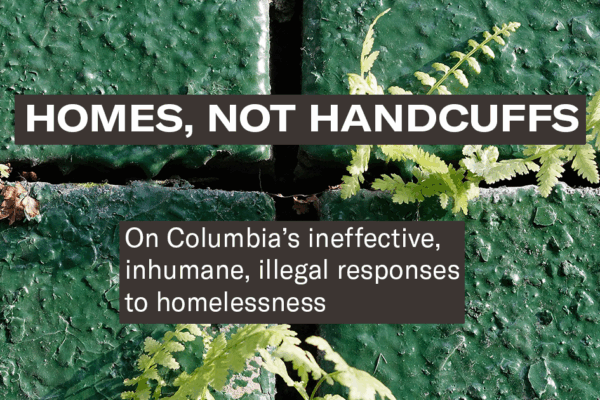COLUMBIA, S.C. – Civil rights organizations and community leaders are urging Columbia Mayor Daniel Rickenmann and City Council to rescind a set of ordinances that attack the rights and dignity of people experiencing homelessness.
The American Civil Liberties Union of South Carolina, One80 Place, Rainy Day Fund, S.C. Appleseed Legal Justice Center, S.C. Housing Justice Network, S.C. Poor People’s Campaign, and Women’s Rights & Empowerment Network sent a letter to city officials demanding that they rescind the following ordinances, which were passed this summer:
- Ordinance 2023-079, which authorizes police to arrest people for sleeping outside, even without giving them an oral or written warning.
- Ordinance 2023-080, which makes it illegal to possess shopping carts.
- Ordinance 2023-081, which criminalizes the possession of a wide range of drug “paraphernalia,” including balloons, bowls, spoons, syringes, and pipes that can be used to smoke tobacco.
These ordinances are ineffective, costly, and, in many cases, illegal. It is also cruel to punish people experiencing homelessness for unavoidable acts of survival, like sleeping, eating, and moving their belongings from place to place.
According to Princeton University’s Eviction Lab, Columbia has the 8th-highest eviction rate of all large cities in the U.S. More than 6 households are evicted every day – many finding themselves with no place to go but the streets. The signers of the letter hope that city leaders will rescind these harmful ordinances and engage in a sincere and collaborative effort to address the root causes of homelessness.
"Homelessness and housing insecurity are real problems that deserve real solutions. The city's costly, counterproductive, and unconstitutional approach must be reversed," said Allen Chaney, Legal Director for the ACLU of South Carolina.
“One80 Place is keenly aware of the perpetual cycle some homeless individuals experience between homelessness and jail. Continuing to criminalize survival does nothing to actually end homelessness,” said Stacey Denaux, CEO of One80 Place.
"We know that people closest to the problem are closest to the solutions. Our members have told us time and time again that fines and charges only create more barriers to safe and affordable housing,” said Kenya Cummings, Director of Strategy and Development for the S.C. Housing Justice Network.
“Criminalizing life-sustaining behaviors for individuals without the finances to make the changes that would allow them to move into housing only adds more barriers — be it additional convictions on a background check, losing jobs because of time in jail, or insurmountable court costs and fees,” said Maisie Osteen, Fundraising Director for the Rainy Day Fund. “Our neighbors deserve more dignity and support rather than the additional barriers to independence these ordinances are sure to create. By supporting this letter, we further our mission to end the criminalization of poverty and move towards a community where one's legal system involvement is not determined by their ability to pay.”
The full letter is available to read below. These are summaries of the main arguments:
Criminalizing Homelessness is Ineffective at Reducing Homelessness
Many factors have contributed to the homelessness crisis in Columbia — poverty, addiction, mental illness, and beyond — but above all else, homelessness is a housing problem. There is simply not enough affordable and available housing for all members of our community, leaving some of us at risk of homelessness. Housing is the answer, not handcuffs.
Criminalizing Homelessness is Expensive
Many people experiencing homelessness have no other choice but to live outside. By punishing conduct like sleeping outside or pushing a shopping cart, Columbia is contributing to what researchers call the “homelessness-jail cycle,” in which some members of a city’s population move back and forth from jail cells to the city streets. This is costly for all of us.
Criminalizing Homelessness is Illegal
Municipalities across the country have long tried to criminalize people for sleeping, sitting, asking for money, playing music, or providing/accepting food in public places. These responses to poverty and homelessness — in addition to being expensive and ineffectual — have been routinely struck down as unconstitutional under the First, Eighth, and Fourteenth Amendments.
Stay Informed
Sign up to be the first to hear about how to take action.
By completing this form, I agree to receive occasional emails per the terms of the ACLU’s privacy statement.
By completing this form, I agree to receive occasional emails per the terms of the ACLU’s privacy statement.

